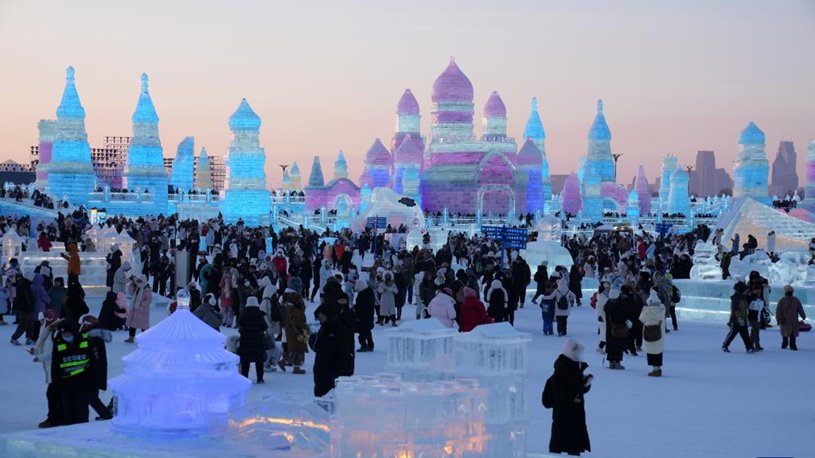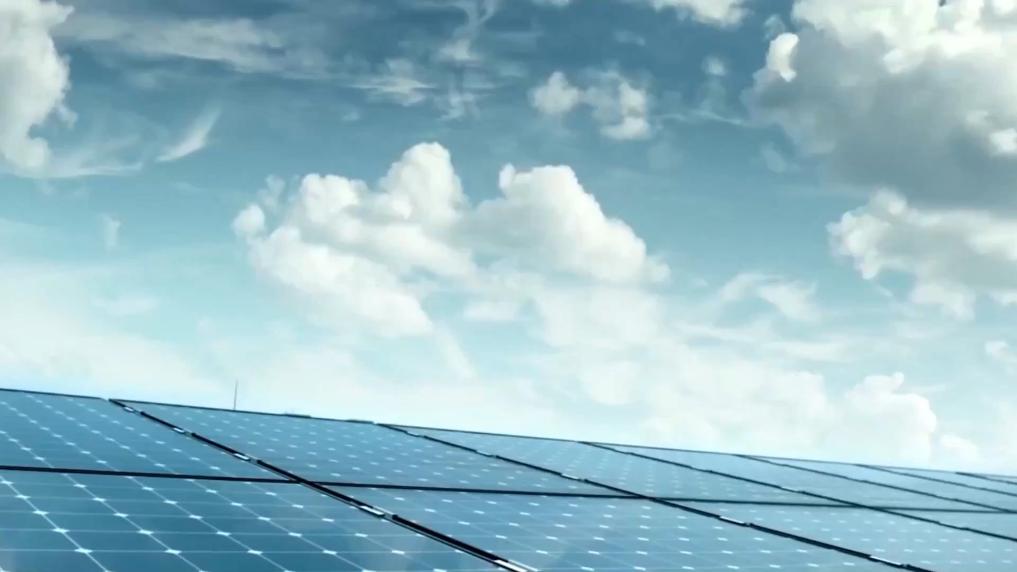* At the beginning of 2024, "uncertainty" and "election" are two key words for unfolding situations in the world.
* The 2024 U.S. presidential election is scheduled to take place on Nov. 5. The struggle between the two parties is expected to intensify.
* The ongoing Ukraine crisis will enter its third year in late February this year, only weeks before the upcoming Russian presidential election scheduled for March.
* The current conflict between Palestine and Israel shows no signs of easing, and its spillover effect has extended from politics and security to economic and social fields.
* The Asia-Pacific region has experienced consistent U.S. disruptions in recent years.
* In 2024, Europe will face numerous political and security uncertainties. The outcomes of this year's election in Latin America will determine whether its political trajectory undergoes a recalibration from "left" to "right."
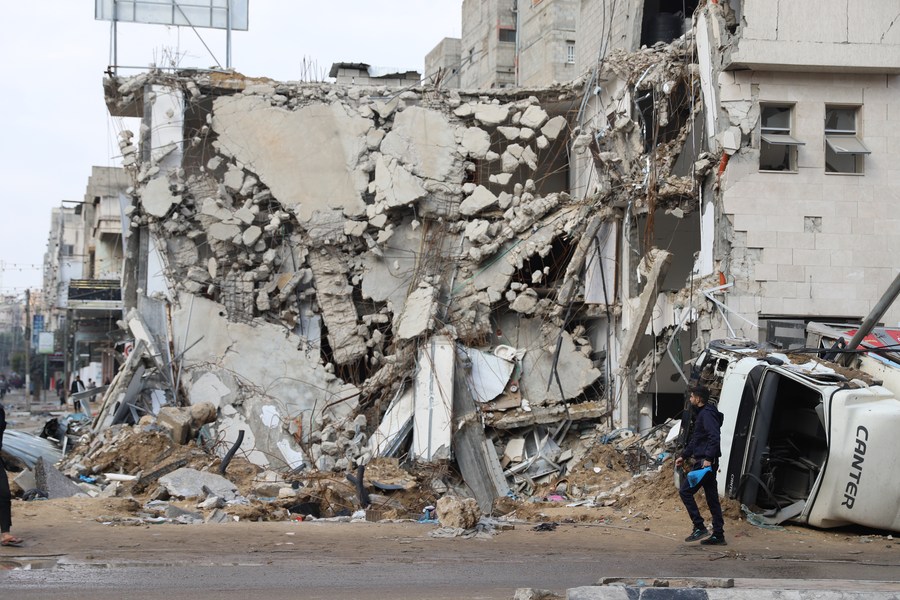
A man walks past a destroyed building in Gaza City, on Jan. 2, 2024. (Photo by Mohammed Ali/Xinhua)
BEIJING, Jan. 3 (Xinhua) -- At the beginning of 2024, "uncertainty" and "election" are two key words for unfolding situations in the world.
The new round of conflict between Palestine and Israel, the future development of the Ukraine crisis and the recovery of the global economy are major reasons behind the uncertainties this year.
The year 2024 is also a "global election year," with important elections in a number of countries. The election results will have a significant impact not only on these countries, but also on the regional and global landscape.
NORTH AMERICA: U.S. PRESIDENTIAL ELECTION TO AFFECT THE WORLD
The 2024 U.S. presidential election is scheduled to take place on Nov. 5. The race for the White House is likely to be between incumbent Democratic President Joe Biden and former President Donald Trump, who is taking the lead in the Republican Party.
The struggle between the two parties is expected to intensify and the U.S. society would be further torn apart, narrowing the room for moderate centrists.
Under the pressure of the election, the Biden administration is expected to try hard to make improvements in the economy, immigration, education and other fields this year. The ongoing Palestine-Israel conflict and the Ukraine crisis may increase the importance of foreign policy in the election.
Analysts said that if Biden manages to extend his tenure, Washington will likely continue its current policies, while if Trump comes to power again, U.S. domestic and foreign policies would undergo major changes. The continuation or change in U.S. internal and external policies will have varying influences on different regions, as the United States tends to intervene in other countries' affairs.
Economists have predicted the U.S. economy is likely to swing between a soft landing and a mild recession in 2024. The reopening of the rate cut cycle by the Federal Reserve is a high-probability event that will impact the global economy significantly.
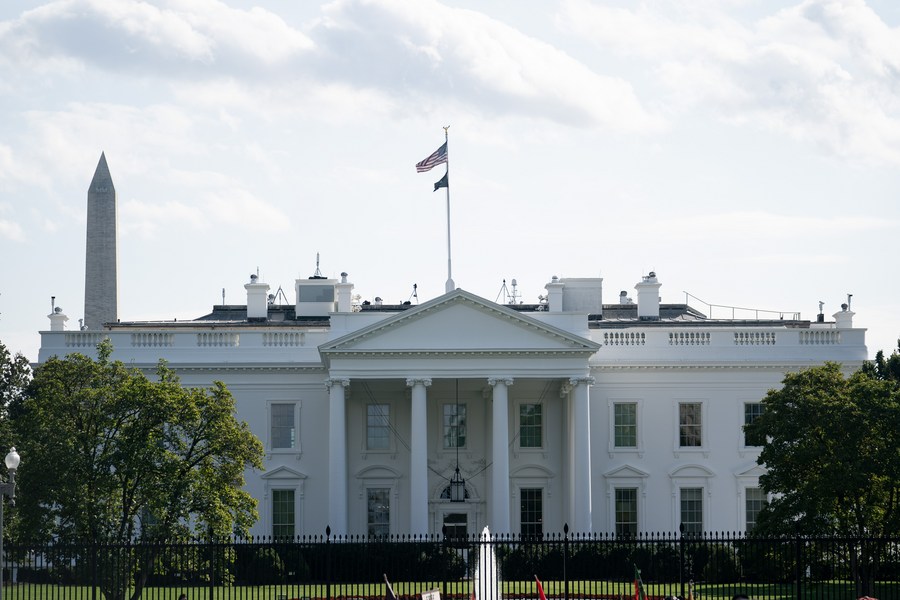
This photo taken on Oct. 9, 2023 shows the White House in Washington, D.C., the United States. (Xinhua/Liu Jie)
EURASIA: UKRAINE CRISIS TO CONTINUE, RUSSIA EYES COOPERATION WITH GLOBAL SOUTH
The ongoing Ukraine crisis will enter its third year in late February this year, only weeks before the upcoming Russian presidential election scheduled for March.
The election is the first since Russia launched its special military operation against Ukraine in 2022. Russian President Vladimir Putin has recently declared his candidacy.
Throughout the Ukraine crisis, opinion polls have consistently indicated sustained support for both the special military operations and Putin. As of now, prevailing public sentiment in Russia suggests a high probability of Putin's re-election.
In 2024, Russia is expected to persist in its struggle with the West regarding Ukraine. Influenced by internal political strife and domestic public sentiments, among other factors, the United States may decrease its assistance to Ukraine, but not entirely disengage from its support.
Ukraine had previously canceled its parliamentary elections in 2023, citing the ongoing conflict as the reason. Regarding the presidential election scheduled for 2024, Ukrainian President Volodymyr Zelensky said it is inappropriate at the moment. However, there are still voices within the country advocating for holding the election as scheduled. Developments in this matter and the potential impact on the overall situation are worth monitoring.

Firefighters extinguish fire at a damaged building hit by recent shelling in Donetsk, Dec. 19, 2023. (Photo by Victor/Xinhua)
Since the Ukraine crisis, the rift between Russia and the West has grown, prompting a rise in the significance of the global South in Russian diplomacy. Fortifying cooperation with the Global South is expected to be a focal point of Russian foreign policies in 2024.
Russia holds the rotating chair of BRICS for the year and will host the BRICS Summit in Kazan in October, aiming at further enhancing cooperation among BRICS members.
The Eurasian region in recent years has witnessed increased regional conflicts and intensified geopolitical competition among major powers. Faced with such a challenging landscape, Eurasian countries would seek a more balanced and diversified foreign policy approach in 2024 to optimize national interests while ensuring stable social and economic development.
MIDDLE EAST: PALESTINE-ISRAEL CONFLICT CREATES TURBULENCE, REGIONAL STATES SEEK MORE INDEPENDENCE
As the world celebrates the new year, there is no sign of easing regarding the current conflict between Palestine and Israel, and its spillover effect has extended from politics and security to economic and social fields.
Although the call for another ceasefire in Gaza to ease the humanitarian crisis is increasing, it remains unsure whether Israel, backed by the United States, is willing to stop its military operation.
The conflict has brought instability and uncertainty to the Middle East, affecting relations between Arab countries and Israel -- restarting the normalization process of Arab-Israeli relations in the short term appears hopeless.
Major powers will continue to exert influence in the region in 2024. The United States will strive to maintain its hegemony in the region amid declining influence following Washington's strategic contraction in the Middle East. As the White House remains overwhelmingly supportive of Israel, regardless of Arab demands and proposals, the rift between the Arab states and the United States will grow further.
In 2024, Iran will hold two key elections -- the parliamentary election and the Assembly of Experts election. The outcomes would impact the country's domestic and foreign policies, and would spill over at the regional level.
As the evolution of the global landscape is speeding up, pursuing peace and development is becoming a consensus of more and more Middle Eastern countries. Major countries in the region have become more independent than ever before, and the regional power structure is becoming more multipolar.
As they actively participate in efforts to shape the international system, countries in the region are becoming an important force in the Global South.
ASIA-PACIFIC: REFUSING TO TAKE SIDE AMID U.S. TROUBLE-MAKING
The Asia-Pacific region, as the primary theater for the U.S. "Indo-Pacific strategy," has experienced consistent U.S. disruptions in recent years.
With a "great power competition" solidifying as a consensus among U.S. politicians, the 2024 election year will drive Washington to intensify its meddling in the Asia-Pacific region for domestic gains. This may involve creating "small circles" to instigate confrontation, thereby escalating regional tensions.
Specifically, the Taiwan Strait, the South China Sea, and the Korean Peninsula are anticipated focal points for U.S. disruptions in the Asia-Pacific region.
In 2024, important elections will be held in several countries in the region, including the leadership election of Japan's ruling Liberal Democratic Party, the parliamentary elections in South Korea, the lower house elections in India, as well as the presidential election in Indonesia and the parliamentary elections in Pakistan, among others.
These elections are expected to have a profound impact on the political landscape of their respective countries, subsequently influencing the regional dynamics and potentially creating spillover effects on the broader geopolitical situation in the Asia-Pacific region.
The fundamental stance of most Asia-Pacific countries is to foster cooperation, pursue development, and maintain a non-aligned position among major powers. With the collective efforts of regional countries, the outlook for the Asia-Pacific region in 2024 is expected to be predominantly peaceful, fostering conducive conditions for stable regional economic development.
According to a forecast by the International Monetary Fund (IMF) in October 2023, the Asia-Pacific region is projected to experience an economic growth of 4.2 percent in 2024, surpassing the global rate of 2.9 percent.

People visit the 20th China-ASEAN Expo at Nanning International Convention and Exhibition Center in Nanning, capital of south China's Guangxi Zhuang Autonomous Region, Sept. 19, 2023. (Xinhua/Zhou Hua)
As a major country in the Asia-Pacific, China has consistently committed itself to upholding regional peace and stability and advancing cooperation, development, and shared prosperity among regional nations.
At the 30th Asia-Pacific Economic Cooperation (APEC) Economic Leaders' Meeting in November 2023, China proposed the joint construction of the next "golden 30 years" for the Asia-Pacific. Ongoing negotiations on version 3.0 of the China-ASEAN Free Trade Area have seen multiple rounds of consultations throughout last year, with both sides aiming to conclude the talks by 2024.
Events such as the China-ASEAN Year of People-to-People Exchanges are scheduled for 2024 to enhance cooperation prospects between China and countries in the Asia-Pacific region in the coming year.
EUROPE: EU LEADERSHIP CHANGE INFLUENCES POLICIES, FAR-RIGHT MAY KEEP GAINING STRENGTH
In 2024, Europe will face numerous political and security uncertainties. The European Parliament elections are scheduled for June, with potential changes in key positions such as the president of the European Commission, the president of the European Council, the president of the European Central Bank, the high representative for foreign and security policy, and the president of the European Parliament.
These changes could significantly influence the European Union's (EU) future policy. Whether the current President of the European Commission, Ursula von der Leyen, who enjoys the support of the United States, could secure re-election will be a focal point.
It is also likely to see a further strengthening of far-right political forces in Europe in the new year. Far-right parties gained significant influence in countries like Finland and the Netherlands, entering cabinets or winning parliamentary elections in 2023.
With the prolonged Ukraine crisis and Palestine-Israel conflicts, a new influx of refugees into Europe may bolster support for anti-immigrant far-right movements.
The Ukraine crisis will continue to be a major security concern for the EU in 2024. Some EU countries may sign bilateral security agreements with Ukraine, pledging long-term intelligence and military assistance. However, dissenting voices within the EU indicate that the union as a whole might be hesitant to take major action.
On the economic front, projections from institutions like the IMF and the European Central Bank suggested a modest recovery for the EU in 2024, with an ease in potential inflation. Nevertheless, research also indicated a less optimistic growth in Germany, the economic engine of the EU.
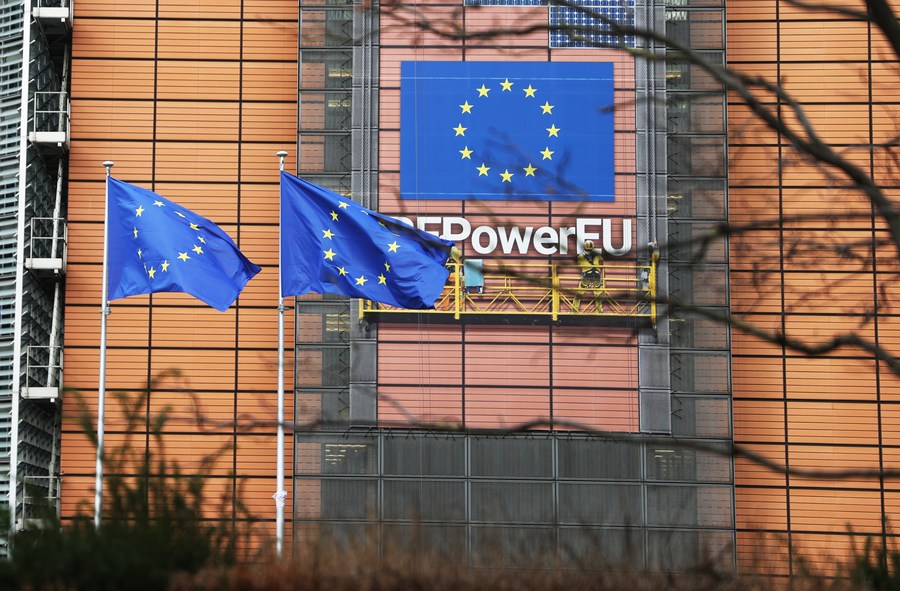
This photo taken on Nov. 15, 2023 shows part of the European Commission building in Brussels, Belgium. (Xinhua/Zhao Dingzhe)
AFRICA: EXPLORING DEVELOPMENT AMID SECURITY, STABILITY RISKS
With the African Union joining the G20 in 2023, and Egypt and Ethiopia becoming members of the BRICS, Africa's participation and influence in global affairs would experience a significant boost in the new year. Africa's increased involvement in global issues will provide substantial support for the continent's development at the strategic level.
Cooperation among African countries is also strengthening. The construction of the African Continental Free Trade Area (AfCFTA) is progressing rapidly, with comprehensive trade set to commence in 2024 via the platform. Thirty African countries are expected to implement the AfCFTA agreement in 2024.
The central banks of 10 African countries have joined the Pan-African Payment and Settlement System, which aims to garner the participation of all African central banks by 2024.
In 2024, the Forum on China-Africa Cooperation (FOCAC) will convene a new session, eyeing broader cooperation between China and Africa across various domains for the well-being of their peoples. Simultaneously, cooperation under the Belt and Road Initiative continues to offer Africa development opportunities.
Stability and security remain pressing issues for the sub-Saharan Africa region in 2024. Political upheavals have been frequent in West Africa and the Sahel region in recent years. Against the backdrop of weak economic recovery and unresolved security issues, similar events would occur in the new year.
The upheavals are also accompanied by surging voices opposing Western control and interference in Africa, implying that the relationships between African countries and their former colonial powers and the European Union may become more complex.
Recent presidential elections in Madagascar and the Democratic Republic of the Congo, as well as upcoming presidential elections in South Africa, Senegal, and other countries in 2024 will have a direct impact on the trajectory of these nations and the region. The acceptance of election results by relevant parties will shape the situation in these countries and the broader region.
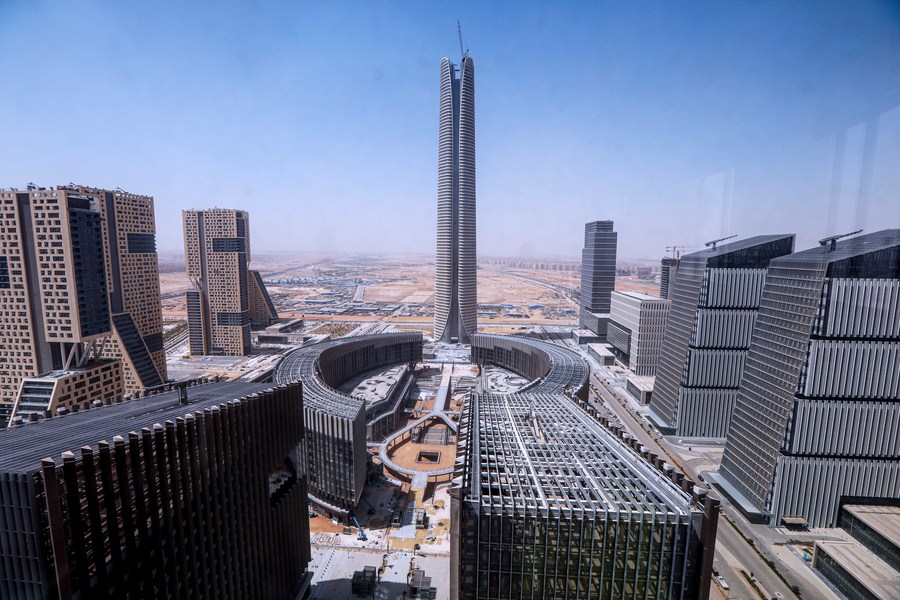
This photo taken on Sept. 11, 2023 shows the construction site of Central Business District (CBD) project in the new administrative capital, east of Cairo, Egypt. (Xinhua/Ahmed Gomaa)
LATIN AMERICA: "LEFT" VS "RIGHT," COOPERATION WITH CHINA TO SEE PIVOTAL YEAR
Following the setback of the left-wing in Ecuador's presidential election and far-right Argentine President Javier Milei taking office, the second wave of the "pink tide" in Latin America has encountered headwinds amid prolonged economic challenges.
As 2024 emerges as a pivotal election year in the region, featuring contests in El Salvador, Panama, the Dominican Republic, Mexico, Uruguay, and Venezuela, the outcomes will determine whether Latin America's political trajectory undergoes a recalibration from "left" to "right."
Meanwhile, the results of the elections will significantly impact the ongoing resurgence of Latin American integration and the effectiveness of regional dispute resolution mechanisms. All these factors will influence the resolution of regional conflicts, including the political crisis in Guatemala and territorial disputes between Venezuela and Guyana.
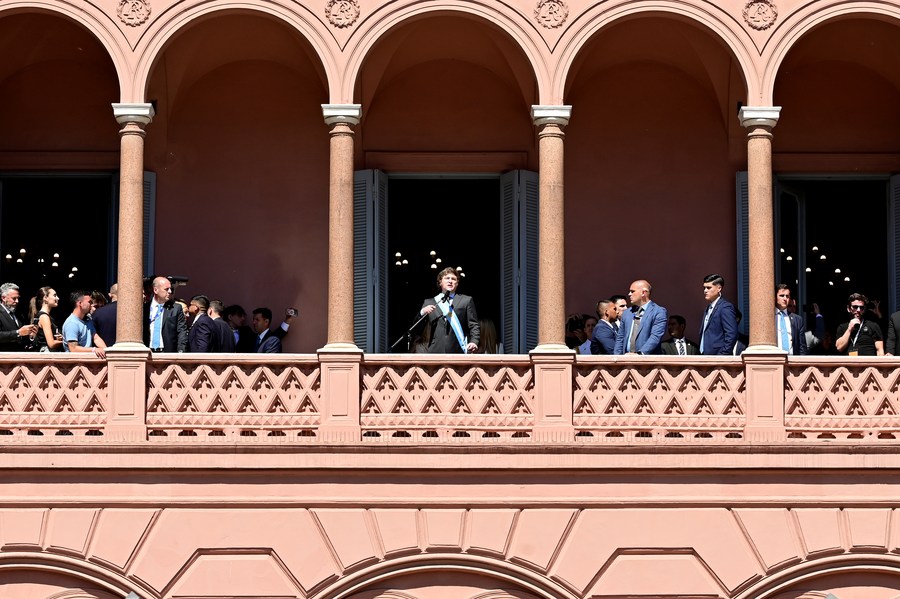
Argentina's new President Javier Milei (C) delivers a speech to the crowd at a balcony of the Casa Rosada Presidential Palace in Buenos Aires, Argentina, Dec. 10, 2023. (Photo by German Adrasti/Xinhua)
China-Latin America cooperation is expected to achieve a fruitful year in 2024. The anticipated China-CELAC (Community of Latin American and Caribbean States) Forum summit would transform from a blueprint into reality.
In 2024, with the G20 and APEC to be both chaired by Latin American countries, the region is set to capture global attention. Against this backdrop, the convening of the China-CELAC Forum summit will serve as a powerful demonstration of the broad consensus and positive progress of the "Global South" in constructing a new paradigm of international relations based on mutual respect, fairness, justice, and win-win cooperation.
It will provide momentum to China-CELAC cooperation and enhance the well-being of both Chinese and Latin American populations, and contribute jointly to the advancement of human progress.(Video reporters: He Yiping, Lyu Yingxu, Liu Weijian, Ismael Peracaula, Paul Giblin; video editors: Jia Xiaotong, Li Qin, Liu Yutian, Liu Xiaorui, Zhu Jianhui, Liu Ruoshi, Li Ziwei)■



